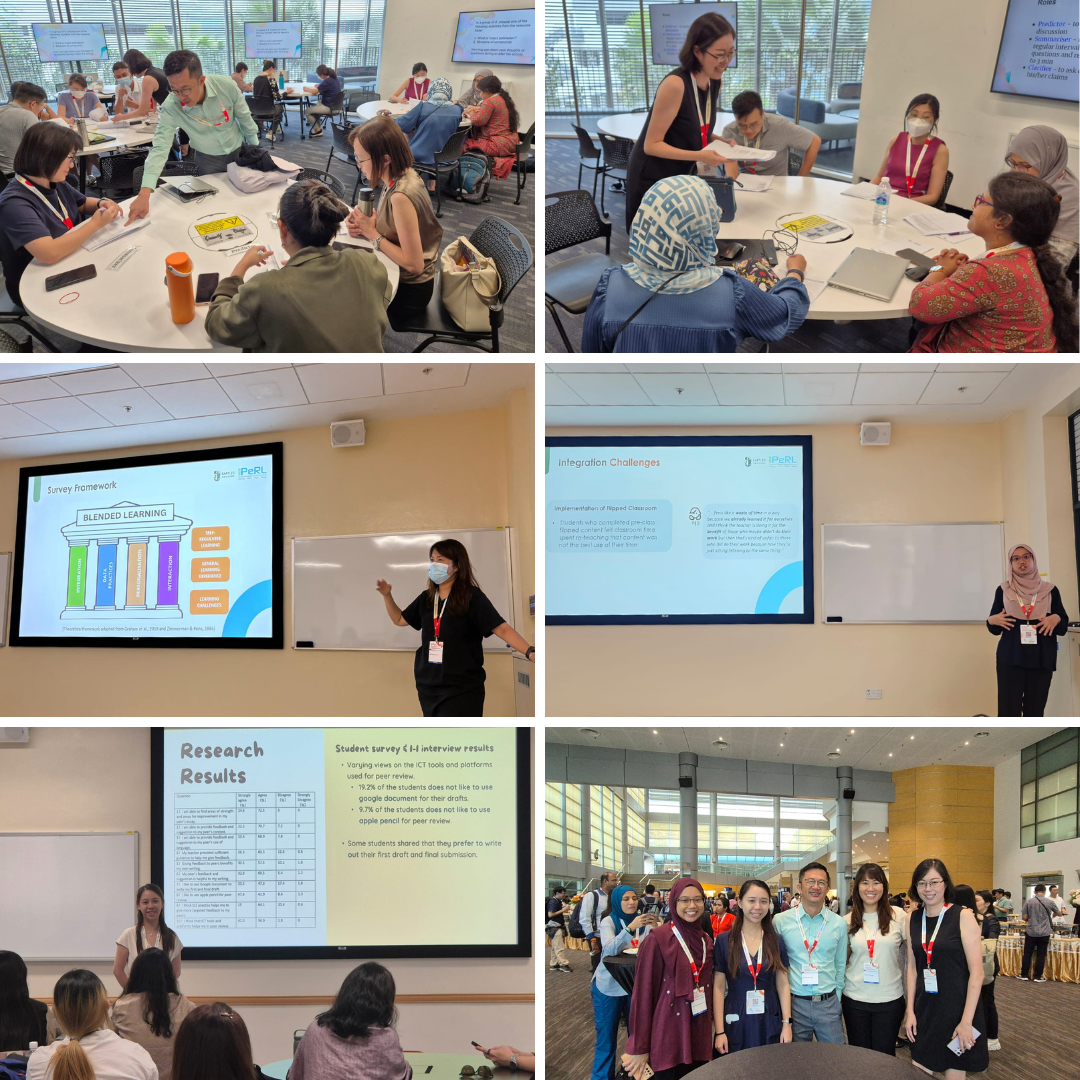Redesigning Pedagogy international Conference 2024
At the recent Redesigning Pedagogy International Conference (RPIC) organised by the National Institute of Education (NIE) from 28 to 30 May 2024, our colleagues presented their latest research findings. Their presentations, aligned with the conference's theme "Growing future-ready teachers and learners: Collaborative research for educational change," aimed to spark essential conversations on translating research into impactful educational practices.
View the presentation abstracts below:
Differentiated instruction for collaborative learning in Science inquiry-based learning
By Chan Sau Siong & Cindy Tiong
Science inquiry-based learning (IBL) often adopts a student-centred approach that requires teachers to design the IBL activities as well as employ facilitation strategies to guide students in their inquiry. This workshop aims to provide teachers with a series of teaching actions that allow students to work collaboratively to achieve the learning goals of inquiry-based learning. With the use of these teaching actions, students assume different roles to cross-examine scientific concepts or data in small groups. Interest is differentiated in the role playing process and instruction is further differentiated based on readiness by providing students with different types of Socratic questions in the inquiry process to support student metacognition. In this IBL approach, teachers play the role of facilitators who guide students in their inquiry process to achieve the criteria of success. This collaborative learning experience has been used in Biology, Chemistry and Physics IBLs in Raffles Girls’ School (Secondary), with the IBL activities ranging from exploring a phenomenon to analysing data and evidence. On the whole, both teachers and students have responded positively to the teaching actions in these IBLs based on the data gathered from teachers, students and third party observations. Students have been able to achieve the learning outcomes with a deeper level of conceptual understanding. In addition, the use of Socratic questions in the collaborative learning process played a role in developing students’ intellectual traits.
An exploratory study on the influence of ICT-enhanced peer review on Secondary 1 students narrative writing skills
By Neo Jiahui
Since 2021, with the implementation of the new Chinese syllabus which places strong emphasis on self-directed learning, as well as the introduction of iPad as student’s personal learning devices in RGS, the RGS Secondary 1 Higher Chinese team from the Languages department embarked on process writing and peer review in the teaching of Narrative Writing. ICT tools and platforms such as google document, Student Learning Space and Apple Pencil are used in the writing and peer review process. In 2022, the Secondary 1 Higher Chinese team began an Action Research on the effectiveness of using technology in peer review on Secondary 1 Higher Chinese Students Narrative Writing skills. Through comparing pre and post essay results, level-wide survey, as well as face-to-face interviews with teachers and students, this research aims to find out: 1) Does ICT-enhanced Peer Review help students to understand the requirement of Narrative Writing? 2) Does ICT-enhanced Peer Review help students to improve their Narrative Writing skills' 3) What are Teachers’ and Students’ feedback on the ICT-enhanced Peer Review process' This presentation will share the process on how the team implemented the ICT-enhanced peer review in our teaching and some takeaways from using ICT tools in process writing and peer review. This presentation can be presented in English or Chinese. (Examples are in Chinese)
Learner’s experience in a blended learning environment: an exploratory study in a secondary school
By Tan Yen Chuan & Hafizah Bte Jumat
This study explores learners' perceptions and experiences in a blended learning environment, aiming to uncover the challenges they face and ways in which the school can provide support. This study employed a single-case mixed-methods research design, utilising a survey with Likert-scale and open-ended questions, as well as focus group discussions. This approach aimed to document students' experiences in both asynchronous and synchronous lessons, both inside and outside the classroom, within a secondary school setting. While there is ample research on blended learning in higher education, there aren't many instruments tailored to the specific needs of secondary school students. The existing literature tends to focus on student engagement without providing comprehensive instruments for secondary schools. To address this gap, key studies by Graham et al. (2006 & 2019), Ginns and Ellis (2007), Bouilheres et al. (2020), Bhagat et al. (2021), and UCF & AASCU (2017) were leveraged, and school management input and expert consultations were sought to adapt the instrument accurately to the secondary school context. To ensure the validity of the survey instrument, a pre-testing phase was conducted with a representative subsample of students. Input from experts further informed its face validity and construct validity and alignment with the intended constructs. Additionally, exploratory and confirmatory factor analyses were performed as part of the validation process. A total of 526 students in Secondary 2 to 4 participated in the survey, with a subset of 18 students from various subject combinations also taking part in the focus group discussions. Findings from this study revealed a strong baseline of blended learning, with students generally managing well and expressing satisfaction with their blended learning experiences. The challenges identified underscore the importance of teachers' purposeful planning and their awareness of students' lived experiences. The insights in this research will be of particular interest to educators looking to gain a deeper understanding of students' perceptions of their blended learning environment. The survey instrument can serve as a valuable tool for educators to gather feedback, inform instructional design while incorporating elements of blended learning, and enhance the overall blended learning experience for secondary school students.
This global platform enabled valuable knowledge sharing among local and international educators and researchers, contributing to the advancement of pedagogical approaches. We are proud to have been part of these vital discussions that shape the future of education.


